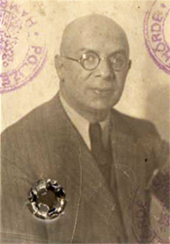Search for Names, Places and Biographies
Already layed Stumbling Stones
Suche
Isidor Blankenstein * 1888
Heinrich-Barth-Straße 10 (Eimsbüttel, Rotherbaum)
1941 Lodz
ermordet am 5.4.1942
further stumbling stones in Heinrich-Barth-Straße 10:
Frieda Aron, Sara Aron, Adele Levy
Isidor Blankenstein, born on 8 Mar. 1888 in Krefeld, deported on 25 Oct. 1941 to Lodz, died there on 5 Apr. 1942.
Heinrich- Barth-Straße 10
Isidor Blankenstein was born on 8 Mar. 1888 in Krefeld (Rhine Province). His parents were Moritz Blankenstein and Sybilla Blankenstein. His father Moritz was born in 1853, his mother Sybilla on 29 Apr. 1856, and his siblings were Simon, Sophie, Alex, Jacob, Betty, Johanna, Friedrich (Fritz), and Otto Blankenstein. In World War I from 1914 to 1918, Isidor served in the 31st Infantry Regiment based in Rensburg and was dismissed with the rank of a "musketeer,” i.e. he was among the foot soldiers within the infantry. As a decoration and badge of honor, Isidor Blankenstein received the Iron Cross Second Class and the Honor Cross for Front-Line Veterans.
Isidor lived in Hamburg, where he met his future wife Helene Blankenstein, née Bluman, born on 17 Nov. 1892 in Hamburg. The couple got married on 22 Oct. 1921, and their only child, Ralph Blankenstein, was born on 29 Sept. 1922. Until 1937, the family lived in the Hamburg quarter of Hamm at Luisenweg 15 III. Since 1932, Isidor worked as a general agent of tobacco products for the Kuhlenkampf & Co., Altmann, and Budde companies. His wife Helene worked as a secretary for the French Consulate General from 1932 to 1935, and his son Ralph attended the Talmud Tora School from 1932 to 1937.
In Apr. 1937, the agent’s status of Isidor Blankenstein was revoked because of his "non-Aryan” descent. As a result, he left Hamburg together with his wife Helene and his son Ralph, heading for the Netherlands. Due to disagreements pertaining to sums of money owed to the Kuhlenkampf & Co., Altmann, and Budde companies amounting to approx. 6,000 reichsmark, a warrant for Isidor’s arrest was issued for allegedly attempting to misappropriate property. When intending to visit his mother in Germany, he was arrested in Kleve (Düsseldorf) and sent to prison in Hamburg on 3 June 1937. Isidor denied having committed any crime, applying successfully for withdrawal of the warrant. Released from prison on 7 July 1937, he returned to his family in the Netherlands. However, by doing so he evaded the condition of reporting to police. Now another warrant for his arrest was issued. Until Sept. 1938, Isidor had German citizenship but he lost it upon leaving the country and became stateless.
His last place of residence in the Netherlands was the internment camp in Hoorn (North Holland). There he was arrested again in 1940, initially brought to Amsterdam and then transferred once more to prison in Hamburg. In the criminal case vs. Isidor Blankenstein, he was represented by his "Jewish legal adviser” ("Konsulent”), M. Israel Samson. ["Jewish legal advisers” ("Konsulenten”) was the designation of Jewish lawyers whose admission to the bar had been revoked, though they had permission to represent or advise other Jews in legal matters.] On 21 July 1941, Isidor was released from the detention center in Hamburg. On 1 Oct. 1941, the Hamburg District Court, Department 135, pronounced a sentence by which the defendant Isidor Blankenstein was acquitted of the charge of fraud to the detriment of the Altmann Company, but at the same time sentenced to nine months imprisonment because of embezzlement to the detriment of Kuhlenkampf & Co. Due to the period spent in pretrial detention, the sentence was considered served.
Isidor Blankenstein was not able to enjoy the freedom just regained for long, for about three weeks later, he received the deportation order at his last residential address in Hamburg, Heinrich-Barth-Straße 10 (at Seligmann’s). Isidor Blankenstein was deported to Lodz on 25 Oct. 1941, and he died in the local ghetto on 5 Apr 1942.
Helene Blankenstein was brought to the Westerbork transit camp in the Netherlands on 16 July 1940, remaining there until 4 Sept. 1944 before being deported to Theresienstadt. Liberated on 8 May 1945, she survived the Second World War.
Isidor’s son, Ralph Blankenstein, was also brought to Westerbork on 6 June 1942. From there, he was initially deported to Theresienstadt on 4 Sept. 1944 and afterward, on 29 Sept. 1944 to the Auschwitz extermination camp, where he was murdered. After the war, Ralph Blankenstein was declared dead as of 2 Feb. 1945.
Translator: Erwin Fink
Kindly supported by the Hermann Reemtsma Stiftung, Hamburg.
© Julianne de Sousa
Quellen: StaHH, 213-11 Staatsanwaltschaft Landgericht-Strafsachen, 1052/42; 522-1 jüdische Gemeinden, 992 e, Band I; 351-11 Amt für Wiedergutmachung, 14540, 45669; www.bundesarchiv/gedenkbuch (Zugriff am 16.10.2013); www.hohenemsgenealogie.at (Zugriff am 20.02.2014); Auskunft Jose Martin v. 17.6.2014.


